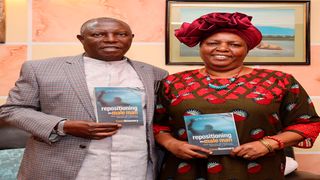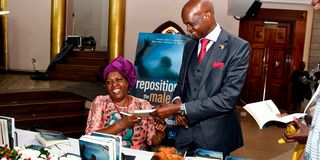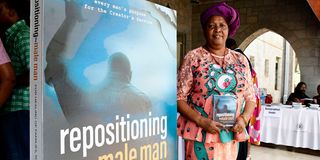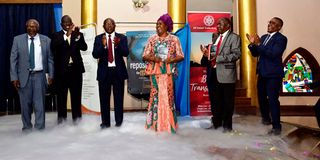
Rev. Sospeter Mbogo a retired mechanical engineer and a priest (left) with his wife Rev. Canontheir Rosemary Mbogo during an interview at their home in Lavington, Nairobi in January, 2024.
| Bonface Bogita| NMGLifestyle
Premium
42 years in marriage: This is what we’ve learnt
What you need to know:
- This is not your ordinary couple. The man is Rev Sospeter Mbogo, a retired mechanical engineer and priest, and the wife is Rev Canon Dr Rosemary Mbogo, who was the chairperson of the National Council of Churches of Kenya between 2012 and 2018. She was the first woman chairperson in the council’s history.
- Canon Rosemary has just released her fifth book titled Repositioning the Male Man: For Healing of Families, Societies & Nations.
No eyelids are batted as man and wife inform us that they have written a joint will. They are, in fact, calm and easy-going as they talk to us about that sensitive topic in their home in Lavington, Nairobi.
Married for 42 years, and with investments that include a prayer and retreat centre in Embu town, their life motto is being open with each other. The stories of a spouse dying with tightly guarded secrets regarding money and property owned will not apply to this family, they tell us. The man would hate having his assets listed with the Unclaimed Financial Assets Authority one day.
Legal experts say the problem with a joint will is that once one partner dies, what was written when they were together can never be altered. That’s fine, they say, they have it covered regarding what happens when one of them goes first.
This is, however, not your ordinary couple. The man is Rev Sospeter Mbogo, a retired mechanical engineer and priest, and the wife is Rev Canon Dr Rosemary Mbogo, who was the chairperson of the National Council of Churches of Kenya between 2012 and 2018.

Rev. Canon Dr. Rosemary Mbogo (left) presents an autographed book to Embu County Senator Munyi Alexander Mundigi during the launch of her book at All Saints Cathedral on February 3, 2024.
She was the first woman chairperson in the council’s history. She was also, for 13 years, a provincial secretary for the Anglican Church of Kenya, a role that entails being the principal assistant to the archbishop of the church.
As expected, the Mbogos take us into the scriptures to explain why secrets should not be entertained in a marriage. They discuss how Adam and Eve, the two first human beings in the creation story in the Bible, were naked but not ashamed.
“(A couple) is not supposed to be hiding from one another, because they’re supposed to be naked. ‘Naked’ is not just the physical body; it’s really transparency and accountability to one another,” says Canon Rosemary.
On the matter of a joint will, Rev Sospeter notes: “You know, men are the ones who write their wills. I did not write a will, me as the man, but I wrote a common will with my wife, so that it’s we now writing our will.”
“Whoever goes first, it’s addressed as to what will happen,” he adds.
The issue of a joint will arise as we discuss a book that Canon Rosemary has edited, in which her husband has written three of 11 chapters. In one of the chapters, he states that it is foolhardy for spouses to keep secrets from each other.
“Having no secrets with your wife raises her faith and trust in you and builds her up, as well as raising her self-esteem,” he writes. “A man may have some bank accounts that his wife is not aware of, or he may have many plots or properties in the country or overseas that his wife has no idea about.”
Five other men, including the Mbogos’ son, have written chapters in the book titled Repositioning the Male Man: For Healing of Families, Societies & Nations.
We are having the interview a few days before the February 3 launch date of the book, scheduled to take place at the All Saints’ Cathedral. By the time you are reading this, the 234-page book will have been launched and on the shelves of the Scripture Union, Ufungamano, among other bookshops.
This is Canon Rosemary’s fifth book and is a product of requests from readers of her first book titled Woman: A Vessel of Honour and Great Potential.

Rev. Canon Dr. Rosemary Mbogo.
“Men get the book and some, after they have read – some even before they have read – begin asking, ‘Why don’t you do a book for men?’ And I would ask, ‘How do I do a book for men and I’m not a man?’” poses Canon Rosemary.
She found a way of doing that — by getting men to write various chapters. Her husband, their son Joash Mbogo, their son-in-law MJ Gitau, lawyer Ambrose Weda, pharmaceutical practitioner Wilberforce Wanyanga, Pastor Simon Kariuki, and engineer Johnson Kamau Njeru. Canon Rosemary says she assigned the various chapters in the book.
“I chose the word ‘male man’ very intentionally because man is male and female. I had to bring a differentiation, that we are not talking about the male and female in this particular subject... We are talking about the male man,” she says.
From the interview with the Mbogos and from the book, we picked five points to run with.
1. A man who fails to take up leadership at home is a failure
The Mbogos are unequivocal in stating that a man should take charge of his home in whatever circumstances. They want him to speak up; to command, guide. They are against men who are mute at home.
“Nature abhors a vacuum. So, when a man keeps quiet, the woman has to try and take over because the man has kept a vacuum,” Rev Sospeter tells Lifestyle. “And then those who now don’t have brakes will go beyond. They’ll overshadow the man.”
The couple then aims at Adam, the first man, saying he blundered by keeping quiet when his wife was being misled by the snake in his presence. They then warn men to speak up to give direction to their wives.
Says Canon Rosemary: “When I went to Sunday school, I was told that when Satan came to Eve, Adam was not there.”
She then reads the Lifestyle team a verse that indicates Adam was present when Eve was told to eat the fruit.
Argues Canon Rosemary: “(Adam) did not take his responsibility. And that is where our problem begins. Go to many homes today. Men are silent. It is women who are speaking. It is women who are going for intercession.
It is women who are reading scriptures. What does that mean? You leave the space for women. You abandon your responsibility. You abandon your assignment. You let the woman take up what is not hers. So, she is playing her role as the mother…and as your wife. She’s also trying to take the role of building boundaries for the home, which is your work. Actually, the issue of the tree is an issue of boundaries.”
In a chapter in the book titled “When Men are Silent”, which encourages men to be the voice of authority at home, Pastor Simon Kariuki argues using the Kikuyu saying: “Mundurume ni mugambo” (a man is equal to his voice).
“There is power and authority in the voice of every male man,” writes Pastor Simon. “Men have a critical role in the leadership of the nation, society and family.”
In a chapter titled “Repositioning the Male Man”, Rev Sospeter argues that men should take up leadership and that women, who ought to deputise men, should never usurp the leadership role at home.
“Man was created as a natural leader in the family and should, therefore, gracefully take that leadership role as God envisaged,” he writes.
2. Let no single mother pretend to be both father and mother
In our interview, the couple advises single mothers never to think they can take up the role of fathers in their children’s lives.
On how to mould a boy being raised by a single mother, Canon Rosemary tells Lifestyle: “Don’t pretend that you are a father and mother. You are a mother. This child needs other fathers within the society who can give the proper masculine teaching and training for the boy child and the covering that he needs from a man as a father so that he can grow out of the pain of being born into a dysfunctional household and be strong enough to appreciate he can actually lead a family because that is important.”
“(The boy) should be enabled to lead a family, to lead in society. Because it is not only the family, by the way. Some people do not progress career-wise because of the childhood hurts and the pain they have gone through in their households,” she adds.
Canon Rosemary does not shy away from saying that she has a problem with men whose names include female names.
“Today we have many children, including men, who are called Kamau Wanjiru, or Wanyambura. Where has that come from?” she poses.
3. A job or business that takes you away from your family has more disadvantages than advantages
In his chapter “Why Men are Silent”, Pastor Simon Mbugua takes issue with men who travel too far and work for too long to provide for their families and in the process deny their wives and children quality time.
“When men leave families behind to make a name for themselves, be it in business politics or elsewhere, they break away from the anticipated norm of a family staying and holding together.
It is a stray into the wild; a warped sense of reasoning to chase after the life of success as the drive. They put value in the wrong things, namely prestige, titles and money,” he writes.
Pastor Simon believes that such a man easily falls into the traps of alcoholism and womanising, which sees him get forgotten by his family and his place taken by someone or something else.
Related to that, in a chapter titled “The Male Man Supporting His Family to Succeed in Life”, Rev Sospeter asks men to turn down offers like scholarships that do not consider their families.
“Once a man is married, he needs to evaluate any opportunity for academic studies or professional development with the eye of the family. Any overseas scholarship that does not include relocating with the family or a minimum of an annual ticket back home should be rejected unless the male man has sufficient funds to maintain his wife abroad.
Sometimes, it may be the wife who gets such a scholarship, and the same principle should apply,” argues Rev Sospeter.
The reverend writes that he once got a master’s scholarship in the UK but dropped it after getting married. Instead, he pursued admission at a local university.
4. Allow your spouse to prosper
Rev Sospeter believes it is improper for a man to be too educated while his wife stagnates. In his chapter titled “The Male Man Supporting His Family to Succeed in Life”, he states that having a wide knowledge rift between husband and wife is a destabilising factor.
“In some cases, the man advances academically up to PhD level while the wife remains at certificate or diploma level. This may happen either because the man got a scholarship to go abroad for studies alone or because he continued to study locally.
Such a disparity in education levels does affect the family since their understanding capacity becomes miles apart,” he states.
In the interview with Nation Lifestyle, he narrates how he had no qualms about letting his wife advance in academics up to PhD level ahead of him. Canon Rosemary was initially a teacher, becoming a principal at the age of 27.
After she did her master’s, she branched into church ministry. She was posted to the Lavington United Church while her husband worked as an engineer. The husband would later study theology as his wife established herself in ministry.
“There is a notion that when you build a wife, she becomes proud and therefore she looks down upon you. But if that marriage was of God and is committed to God, even if the wife becomes the president of Kenya, she is still subject to her husband at home.
I remember when she started pastoring before me. On my side, I was practising engineering. She would tell people in church, ‘I am the pastor here in church, and the pastor for my husband. But he is a priest when we get home,’” Rev Sospeter says.
“Let her go as far as she can go. If she happens to even be more gifted than you in terms of academics, then let her go get a PhD even if you don’t have a PhD. You’ll be actually helping her while also helping yourself,” he adds.

Rev. Canon Dr. Rosemary Mbogo (third right) on stage during the launch of her book at All Saints Cathedral on February 3, 2024. The book is titled Repositioning the Male Man for healing of Families, societies and Nations. With her is (from left) Dr. Wanyanga, Ambrose Weda, Pastor Simon Kariuki, Rev. Eng. Sospeter Mbogo (husband to Canon Rosemary) and Joash Mbogo.
5. Who said your children can only inherit your property when you die?
“The idea that inheritance is given out when people die is, in many cases, self-defeating,” the book states in its fifth chapter, written by Rev Sospeter.
He argues that a man should support his children to succeed while alive.
“If the man is blessed with much property, after establishing a good rapport with his children and confirming how responsible they are, it is imperative that he bequeaths some of his property while he is still able to offer them wise counsel on how best to operate or multiply what he has given them. It is the joy of a man to see his children succeed and progress in life,” he writes.
“I recall my own dad dividing all his many pieces of land among his sons when he was only 65 years old. This enabled him to see what we did with the land for 36 years of his life,” he adds.





